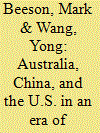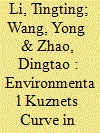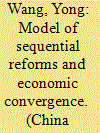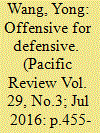|
|
|
Sort Order |
|
|
|
Items / Page
|
|
|
|
|
|
|
| Srl | Item |
| 1 |
ID:
131665


|
|
|
|
|
| Publication |
2014.
|
| Summary/Abstract |
Tensions in the Asia-Pacific region are rising as a consequence of the U.S. "pivot" to Asia and China's increasingly assertive foreign policy. Other states in the region must try to reconcile potentially conflicting economic and strategic imperatives as a consequence. Australia illustrates these dilemmas. We ask what role regional institutions can play.
|
|
|
|
|
|
|
|
|
|
|
|
|
|
|
|
| 2 |
ID:
150888


|
|
|
|
|
| Summary/Abstract |
This paper applies a panel of 28 provinces of China from 1996 to 2012 to study the impacts of economic development, energy consumption, trade openness, and urbanization on the carbon dioxide, waste water, and waste solid emissions. By estimating a dynamic panel model with the system Generalized Method of Moments (GMM) estimator and an autoregressive distributed lag (ARDL) model with alternative panel estimators, respectively, we find that the Environmental Kuznets Curve (EKC) hypothesis is well supported for all three major pollutant emissions in China across different models and estimation methods. Our study also confirms positive effects of energy consumption on various pollutant emissions. In addition, we find some evidence that trade and urbanization may deteriorate environmental quality in the long run, albeit not in the short run. From policy perspective, our estimation results bode well for Chinese government's goal of capping greenhouse emissions by 2030 as outlined in the recent China-US climate accord, while containing energy consumption and harm effects from expanding trade and urbanization remains some environmental challenges that China faces.
|
|
|
|
|
|
|
|
|
|
|
|
|
|
|
|
| 3 |
ID:
137517


|
|
|
|
|
| Summary/Abstract |
Motivated by China's experience, a growth model is developed to explain the repeated interaction between economic reforms and growth in a developing country. Convergence occurs until the developing country reaches a bottleneck, then convergence stops unless the institution is improved. After the reform, convergence resumes until a new bottleneck is encountered, which triggers another reform, and so on. Using recursive methods, I show analytically that, in a perfect international credit market, each reform occurs when the new growth bottleneck just becomes binding; the reform size changes monotonically over time; there are finite reforms and convergence is unceasing until the last constraint binds, so a permanent GDP gap may exist. The model also implies that a politically more powerful government should adopt more gradual reforms. In an imperfect credit market, convergence can be delayed and an initially richer economy can be more likely to adopt insufficient reforms.
|
|
|
|
|
|
|
|
|
|
|
|
|
|
|
|
| 4 |
ID:
144910


|
|
|
|
|
| Summary/Abstract |
China's Belt and Road initiative came from the combined pressure of slowing down of Chinese economy, US pivot to Asia and deterioration of the relations with neighboring countries after weathering the storm of the Global Financial Crisis of 2008. It also symbolizes a more proactive approach of Chinese new leader Xi Jinping in meeting the expectation on China's international obligation and leadership. Aimed to link Asia, Europe, Africa and Oceania, the initiative provides tremendous opportunities of international economic cooperation. The paper argues that as China's contribution to international public goods, it is in the line of economic liberalism; as China's grand strategy, it is more of defensive than offensive by nature. Despite risks and uncertainties exist, the enforcement will boost China's influence and position in regional and international institutions. US should consider making more strategic space to the rising China, and a better coordinated China–US relations will make Asia Pacific a safer and more promising region.
|
|
|
|
|
|
|
|
|
|
|
|
|
|
|
|
|
|
|
|
|